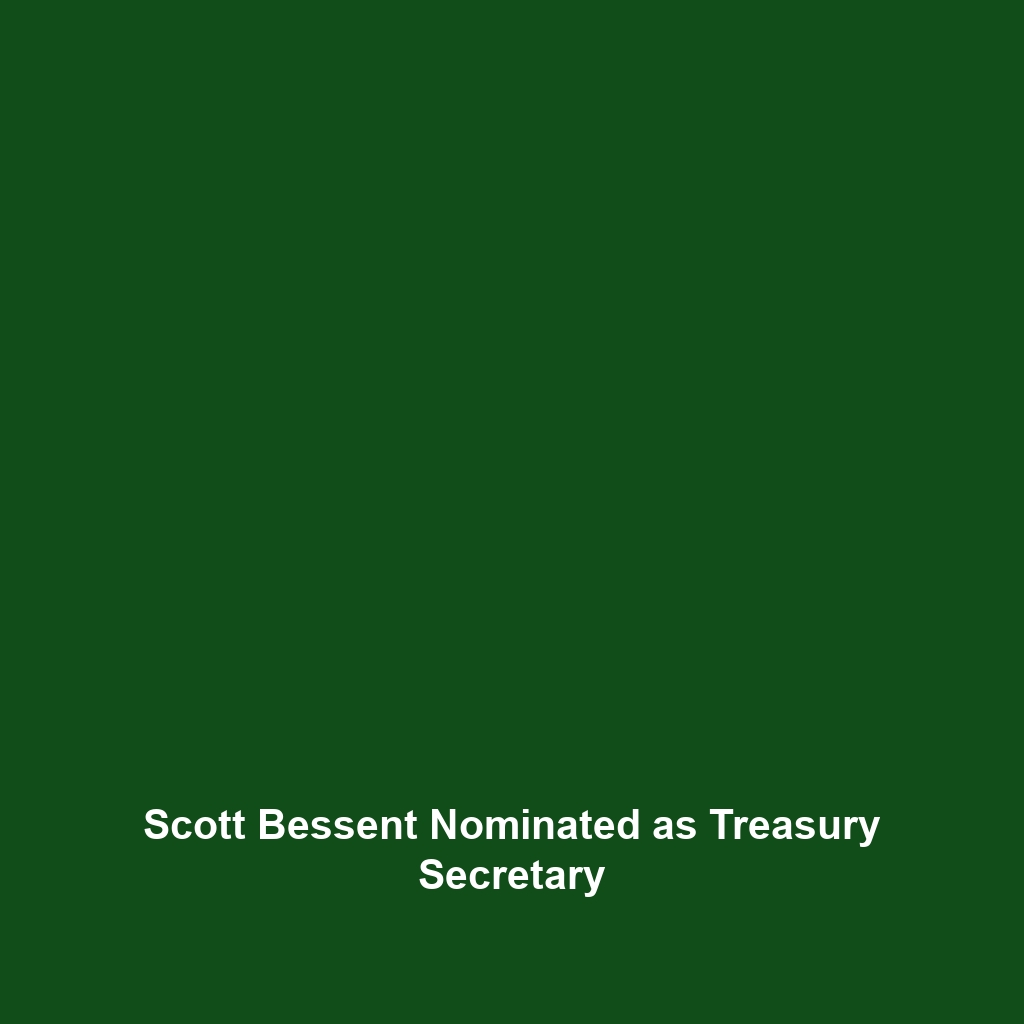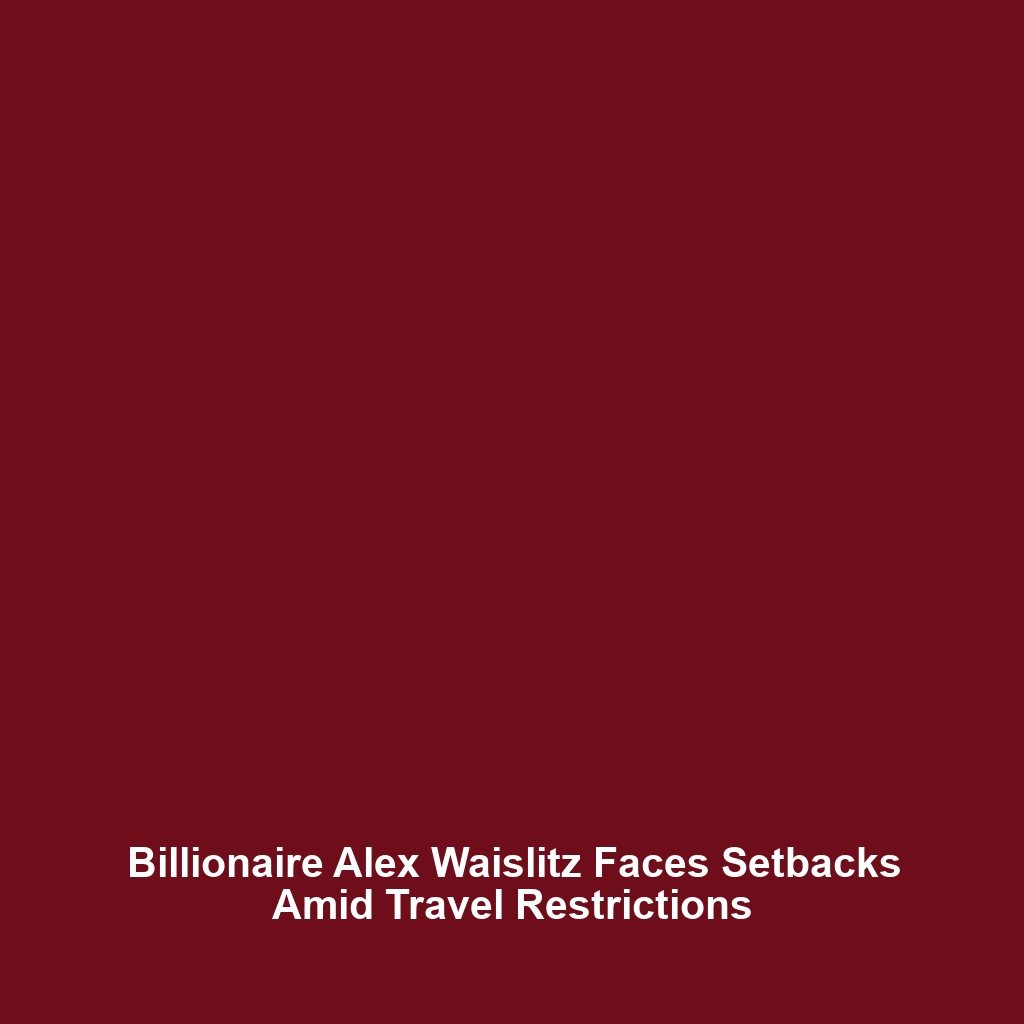Your cart is currently empty!
Tag: billionaire investor

Scott Bessent Nominated as Treasury Secretary
Scott Bessent Nominated as Treasury Secretary
Scott Bessent Nominated as Treasury Secretary
In a significant move ahead of the upcoming administration, former President Donald Trump has nominated billionaire investor Scott Bessent as the new Treasury Secretary. This decision is part of Trump’s broader strategy to revitalize the U.S. economy with an ambitious framework known as the “3-3-3” economic plan. The nomination has drawn attention due to Bessent’s extensive background in finance and investment management, as well as his close ties to the former president.
Profile of Scott Bessent
Scott Bessent, an accomplished financier and the former Chief Investment Officer of George Soros’ family office, has built a reputation for his strategic investment prowess. During his tenure with Soros Fund Management, Bessent was instrumental in overseeing a diversified portfolio totaling over $25 billion in assets. His experience in both macroeconomic analysis and asset management has positioned him as a prominent figure in the finance industry.
Bessent has also established his own investment firm, Bessent Capital, focusing on global markets and delivering superior returns to clients. His expertise in navigating complex financial landscapes makes him an appealing candidate for the role of Treasury Secretary, especially as the U.S. seeks to recover from the economic impacts of the COVID-19 pandemic.
The “3-3-3” Economic Plan
In his nomination announcement, Trump emphasized Bessent’s proposed “3-3-3” economic plan. This plan outlines three key focuses: fostering growth, reducing regulations, and achieving a balanced budget in three years. Bessent argues that this framework will promote both short- and long-term economic stability while also addressing pressing national issues.
Fostering growth: Bessent proposes increased investment in key sectors such as technology, infrastructure, and renewable energy. By allocating resources into these areas, he aims to spur innovation and job creation across the nation.
Reducing regulations: The plan advocates for streamlining regulatory processes that Bessent and Trump argue stifle small business growth and innovation. This would involve a comprehensive review of existing regulations and the elimination of those deemed overly burdensome.
Achieving a balanced budget: Bessent’s plan also emphasizes fiscal responsibility, with a goal to balance the federal budget within three years. This effort would focus on curtailing wasteful spending while promoting efficiency in government programs.
Reactions to the Nomination
The nomination of Bessent has elicited a range of responses from political analysts and industry experts. Supporters of the appointment highlight Bessent’s extensive experience in finance as a critical asset for the Treasury Department. They believe his knowledge can lead to effective economic strategies that align with the Trump administration’s goals.
Conversely, critics express concerns regarding the influence of wealth in government and the potential for policy decisions that favor the financial elite. They argue that Bessent’s background in hedge funds could skew his perspective on economic issues that affect everyday Americans. “There’s a fine line between encouraging investment and catering to the interests of billionaires,” noted Judy Goldstein, a political economist at the Brookings Institution.
Challenges Ahead
Should Bessent’s nomination be confirmed, he will face immediate challenges, including addressing the economic recovery post-pandemic and navigating the complexities of global trade relations. Experts point out that the ongoing supply chain disruptions and inflationary pressures will require strong leadership and innovative solutions.
Additionally, Bessent will need to work closely with Congress to implement his “3-3-3” plan, which may encounter resistance from lawmakers who prioritize different economic agendas. Building bipartisan support will be essential for any substantial changes to occur.
Conclusion
Scott Bessent’s nomination as Treasury Secretary marks a notable shift in economic leadership under the Trump administration. His proposed “3-3-3” economic plan could redefine U.S. fiscal policy if successfully implemented. As the new Treasury Secretary nominee, Bessent must navigate a landscape rife with challenges, all while demonstrating the ability to foster economic growth for all Americans. The coming weeks will be crucial as both policymakers and the public respond to this pivotal nomination.
For further updates on this nomination and its implications for U.S. economic policy, readers are encouraged to follow reliable news sources and government announcements.

Billionaire Alex Waislitz Faces Setbacks Amid Travel Restrictions
Billionaire Alex Waislitz Faces Setbacks Amid Travel Restrictions
Billionaire Alex Waislitz Faces Setbacks Amid Travel Restrictions
Billionaire investor and entrepreneur Alex Waislitz is currently navigating a series of challenges as ongoing legal disputes hamper his international business operations. The founder of Thorney Investment Group, Waislitz has built a reputation in the investment world, but recent developments have raised concerns about his mobility and the impact on his portfolio.
Legal Disputes and Their Impact
Waislitz is embroiled in multiple legal battles, which have significantly disrupted his business dealings across borders. Sources indicate that these legal challenges are not only draining resources but also causing delays in critical investments that could expand his business empire.
The primary legal issue revolves around allegations related to investment practices and compliance with international regulations. Details regarding these allegations remain closely guarded, but industry insiders have noted how they have already impacted Waislitz’s ability to travel freely and engage with potential investors and partners worldwide.
Travel Restrictions Compounding Challenges
As the legal disputes unfold, Waislitz’s international travel has become increasingly restricted. Lawsuits, particularly those that overlap with international jurisdictions, often complicate a defendant’s ability to travel. Waislitz’s caution in undertaking international trips is evident, especially as he faces increased scrutiny in several countries.
Travel restrictions have a cascading effect on business ventures. For an investor like Waislitz, who frequently seeks opportunities in emerging markets, being physically absent from those regions can jeopardize potential partnerships and significantly stall negotiations.
Investor Sentiment and Market Reaction
Market analysts are closely watching how these legal woes will affect Waislitz’s investment strategy moving forward. According to data collected from The Australian Financial Review, investor confidence seems to be wavering as reports of the legal challenges circulate.
“When a high-profile investor like Waislitz faces legal challenges, it naturally raises a red flag for other investors,” said Dr. Helen Fisher, a financial analyst at MarketWatch. “Investors typically prefer to engage with individuals who have a clear path and a solid reputation. The ongoing issues could alter the perceptions of his portfolio.”
Comparative Analysis of Industry Challenges
Waislitz is not alone in facing obstacles amid growing scrutiny of investment practices globally. Other investors have similarly experienced disruptions due to legal challenges, either stemming from regulatory changes or unexpected legal disputes. This trend appears reflective of broader uncertainties within the investment landscape, particularly regarding compliance and ethics.
For example, high-profile cases involving other billionaires have illustrated the precarious balance between aggressive investment strategies and adherence to legal obligations. These cases often highlight how quickly investor reputations can be impacted.
Future Outlook: Will Waislitz Overcome the Setbacks?
Looking ahead, the future for Waislitz remains uncertain amid these legal challenges. Analysts suggest that addressing the legal concerns head-on and re-establishing a strong public relations strategy could mitigate some damage to his reputation.
“Waislitz might find a way to navigate these challenges by being transparent about the legal issues and taking steps to comply with all necessary regulations,” noted Dr. Jennifer Mendez, an expert in investor relations. “Communication is key in maintaining stakeholder trust.”
Conclusion: The Road Ahead
As billionaire Alex Waislitz faces significant hurdles in the form of legal disputes and travel restrictions, the implications for his businesses will unfold over time. While his legal battles may present immediate obstacles, how he chooses to navigate these challenges will determine the trajectory of his investments and reputation in the long run.
Stakeholders and analysts will be watching closely to see if Waislitz can regain the momentum that has characterized his investment career thus far. His ability to adapt to the landscape of international business amid legal ramifications could ultimately serve as a case study for investors worldwide.